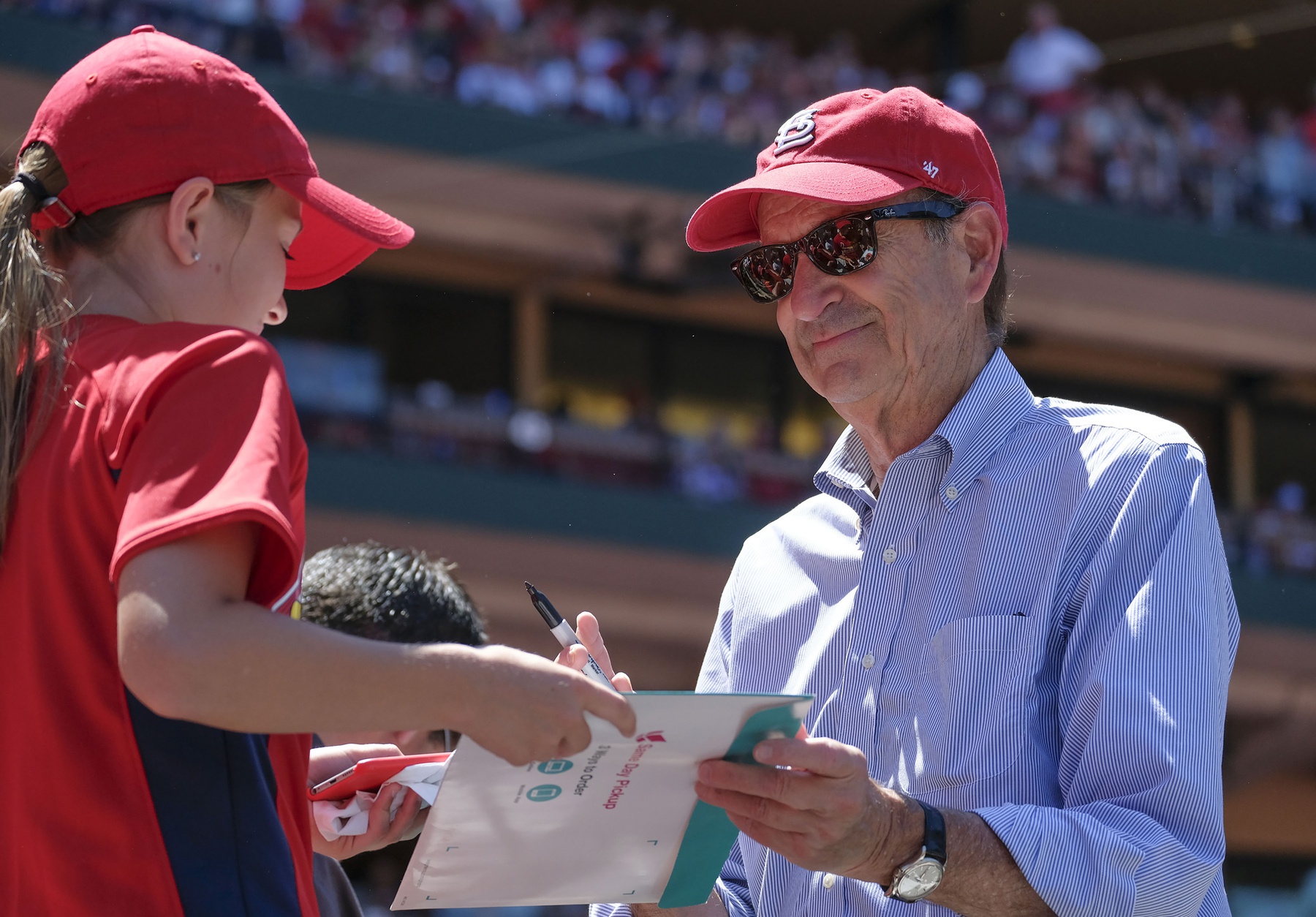We begin today’s chronicle with a quote from Cardinals chairman Bill DeWitt Jr.
“In some places a winning record, or even .500, is even acceptable. Not with this city, not with this franchise, not with its history, and not with the fans.”
Whoa! Stand back? When is the news conference?
The 2023 Cardinals are dreadful and the chairman is about to shake things up.
No, and I’m sorry that I teased you.
That quote was from 2018, after DeWitt and president of baseball operations John Mozeliak fired manager Mike Matheny just before the All-Star break.
DeWitt also shared some thoughts about continuity in his post-Matheny discussion with Goold. Bill made it clear: continuity has limits that are directly related to the team’s performance.
“Continuity is desirable, but when it’s not working, you feel like a change needs to be made,” DeWitt said back then. “Continuity in and of itself isn’t a goal. You want a successful team, to be in the playoffs. You put a team together and take your chances.
“What you value is consistent winning. Continuity has value in that regard, but not when it’s not working. We have won, we’re marginally over .500. It’s not like we’re 20 games under .500 and are desperate. I think we have a really good club and fresh leadership, a fresh start will enhance the opportunity for this club to do much better.”
No, Bill, you’re not 20 games under .500 right now on July 10, 2023.
But for this franchise, lollygagging at 14 games under .500 is an embarrassing failure that should be beneath your standards.
This wouldn’t be acceptable to the Bill DeWitt of 2018.
From what I can tell, the DeWitt of 2023 is nothing like that.
Not based on what we’ve seen, anyway.
Perhaps he’ll get mad enough to take the lead on reshaping the Cardinals.
Five years after DeWitt sounded off in a clear and unmistakable manner, the Cardinals have arrived at another All-Star break and are much, much worse off than in 2018.
During the expansion era – which began in 1962 for NL teams – here are the five-worst winning percentages by a Cardinals team through the first 90 games of a season:
— 1978, .400
— 1990 .411
— 1995 .411
— 1986, .422
— 2023, .422
That means 56 of the past 61 Cardinal teams had a better record than these 2023 Redbirds at this point of the schedule.
At this latest All-Star intermission the Cardinals are 14 games under .500 with a hazy, crazy 38-52 record and trail the first-place Reds by 11 and ½ games in the NL Central. STL’s .422 winning percentage ranks 25th in the majors and 13th in the National League.
With the losses piling up like abbreviated starts, errors and blown saves, I’ll ask a question that’s been on my mind:
What will Mr. DeWitt do about this?

Jun 3, 2018; St. Louis, MO, USA; St. Louis Cardinals principal owner and chairman Bill DeWitt Jr. signs an autograph for a young fan during the seventh inning against the Pittsburgh Pirates at Busch Stadium. Mandatory Credit: Scott Rovak-USA TODAY Sports
Not only is the franchise off to a historically horrendous start in 2023, its performance is substandard in every area except offense – and even that could be better. The starting pitching is fragile and ineffective. The bullpen is a fire hazard. The defense has collapsed. The baserunning is incoherent. Some of the decisions being made in the dugout can cause migraines. When my doctor asked me why my blood pressure is running high, I blamed it on watching the Cardinals.
Mozeliak is in a roster-construction slump that couldn’t pass code, and the problem has turned extreme. Mozeliak’s faulty planning of the starting rotation (again) is the No. 1 reason for the team’s abysmal showing in 2023, an incomprehensible flaw that is all but impossible to overcome. The Cardinals’ usual run-prevention security has cracked, and they’ve gone all Humpty Dumpty to land in last place.
So I ask again: what will Bill DeWitt Jr. do about this?
Up front, let me say that I don’t expect BD3 to fire Mozeliak or Marmol during the season. And I’d be surprised to see either man sacked after the season.
Why?
In the spring DeWitt gave Mozeliak a two-year contract extension that lasts through 2025 and the two baseball partners are very close. Mozeliak hired Oli Marmol after a fallout with previous manager Mike Shildt. And Shildt was promoted after Mozeliak dumped Mike Matheny a game before the 2018 All-Star break.
I expect Mozeliak to stand by his man. If Mozeliak makes another managerial change, he’d be hiring his fourth manager since mid-July 2018. That would only add to the embarrassment and reaffirm what we already suspect: Mozeliak doesn’t know what he’s doing when choosing managers.
No doubt about it, Marmol is burdened by Mozeliak’s failure to provide the team with a solid rotation and a deeper bullpen. But no free passes will be distributed here; Marmol and his staff have allowed the team’s defense and baserunning to deteriorate, and that shouldn’t be overlooked or accepted with a shrug.
Tony La Russa doesn’t work here any more, and the managerial bloodlines have weakened with each subsequent hire made by Mozeliak since bringing in Matheny after La Russa retired following the 2011 season.
But we must understand that Mozeliak has nothing to fear because he’s protected by DeWitt. And Marmol has nothing to fear because he’s protected by Mozeliak. And DeWitt has nothing to fear because he owns the team.
What a cozy, convenient arrangement this is.
And you wonder why there’s no accountability?
DeWitt controls all of this. He can change all of this. He received immense and justifiable praise for all that he’s done since his ownership group purchased the Cardinals before the 1996 season. It’s been a hugely successful era, but the greatness is gradually fading. The reality is underlined by his team’s 5-17 record in the last 22 postseason games – a bleak October-ball decline that includes a 1-9 mark in the last 10 playoff games.
Even when the Cardinals pull off something spectacular, they screw it up.
The Cardinals traded for first baseman Paul Goldschmidt before 2019, and made a deal for third baseman Nolan Arenado in advance of the 2021 campaign. St. Louis management gave up little talent in each exchange.
Goldschmidt won the NL MVP award last season and Arenado finished third in the voting. But what do the Cardinals have to show for the Goldschmidt-Arenado cornerstone that’s been in place since ‘21?
Since the start of the 2021 season the Cardinals rank 10th in the majors with a .534 winning percentage. That’s good, but it’s also down five spots from the .548 winning percentage that put the Cards at No. 5 in baseball from 1996 through 2020. Even worse, the Cardinals are winless (0-3) in the postseason with Goldschmidt and Arenado together.
Think about it. The Cardinals made two heists to to pilfer Goldy and Arenado for the betterment of the franchise … and the team has actually gotten worse? Yes. That’s a fact. So what was the point of trading for two potential Baseball Hall of Fame talents if you neglect to put an above-average rotation – and other fine accessories – around them?
Let’s focus on the pitching which is the most valuable asset a team has.
– Since the start of the 2021 season the Cardinals rank 15th in the majors in starting-pitcher ERA and are 19th in starting-pitcher WAR.
– From 2011 through 2020, the Cardinals ranked third in MLB for starting-pitching ERA and were seventh in starting-pitching WAR.
— From 2015 through 2022, St. Louis pitching staffs — starters and relievers — collectively ranked seventh in MLB for Win Probability Added. This season the STL pitching staff ranks 28th in WPA, ahead of only Kansas City and Oakland. Deplorable.
A critical part of the Cardinals’ extensive success through most of the DeWitt years – stable, reliable pitching and run prevention – has eroded. And the repercussions are coming in with a heavy force in 2023.
For this and many other reasons DeWitt shouldn’t be content with the state of his baseball team. But here we are.
What about 2024? Will it be more of the same? The model isn’t working, Chairman. It’s outdated. The Cardinals have turned stale, and 2023 is the result of a slow-motion decline that could not hold.
I’d like to know if DeWitt’s high standards that he strongly espoused in mid-July 2018 are still applicable at the All-Star break in 2023.
I’d like to know why the “unacceptable” term he put on the 2018 Cardinals has been stripped and removed from DeWitt’s analysis of a 2023 squad that hasn’t been above .500 since the third game of the season (2-1). These Cards have spent 67 days in last place in the NL Central and have been lodged on the bottom floor continuously since May 29.
DeWitt is fine with this?
If so, this isn’t the Bill DeWitt I know … or used to know.
In the past we’ve seen DeWitt take bold, aggressive action to elevate the franchise. He transformed Cardinals baseball at least four times since taking over in 1996.
1. Hiring La Russa before ‘96, increasing player payroll, then giving the front office freedom to improve the roster with a series of effective free-agent buys and low-cost, good-value trades. The Cardinals won the division and advanced to Game 7 of the NLCS in DeWitt’s first season as owner – the first time the Rebirds had competed in the playoffs since 1987.
1a. The Mark McGwire acquisition in 1997 didn’t do much to enhance the team’s overall record through 1999 – all of those home runs couldn’t overcome problematic pitching – but the Cardinals turned into a showcase entertainment vehicle that created excitement in every ballpark they visited. As the kids would say, the Cardinals reestablished their brand. The McGwire-generated revenue was part of setting the table for a fantastic run that began in 2000 and lasted through the 2006 World Series title. A fellow named Albert Pujols had a lot to do with that; he and La Russa became the brand.
2. DeWitt cultivated developed the plan for the new Busch Stadium, with 78 percent of the project being funded by team ownership. The new ballpark opened in 2006 and gave the Cardinals another boost in revenue that secured financial prosperity for the franchise.
3. DeWitt correctly assessed the changes in the baseball industry and realized that the Cardinals must implement a more efficient way of building the roster – with extra emphasis on drafting and player development to create a flowing internal pipeline of homegrown talent.
DeWitt got the jump on most MLB teams by creating an analytics department to give the Cardinals data that can provide an extra competitive edge. In the early aughts DeWitt brought in Jeff Luhnow from the corporate world to head the mission, and under this new model the Cardinals thrived by winning four NL pennants and two World Series from 2004 through 2013. And from 2000 through 2013, only the big-spending Yankees won more regular-season and postseason games than DeWitt’s payroll-efficient Cardinals.
4. DeWitt’s desire to alter the front office approach to win and stay ahead of the industry curve was so ruthless, he fired the highly respected GM Walt Jocketty after the 2007 season because Walt couldn’t accept Luhnow’s rising influence in the baseball operation. Yes. DeWitt did that. He sacked his successful GM only one season after winning the 2006 World Series to make sure the front office was smoothly aligned to fit his forward-thinking philosophy. But look at this now; the man who fired Jocketty won’t shake up the organization and do a reset in a meaningful way.
Where is that relentless owner now? At age 81, has DeWitt lost his fastball, or is he just tired? I’m not being flippant here; perhaps Bill has had enough. Burnout is a thing, even for ownership that’s involved in baseball decisions. And I wonder if financial pressures – including the local TV-contract imbroglio, real-estate investments, etcetera – bothering him?
Is DeWitt disillusioned by MLB’s payroll escalation and adverse to the idea of keeping up with trends initiated by new franchise owners who will spend anything and do anything to win?
According to Cots Contracts, the Cardinals’ 40-man competitive-balance tax payroll has hit the $200 million this season. That’s notable because DeWitt had never gone there before. But with other owners being more ambitious – foolishly so or otherwise – St. Louis ranks 16th among 30 teams in the 40-man payroll. That’s their lowest ranking since the 40-man competitive-balance tax system began in 2012.
To add to that, the Cardinals haven’t received the expected value for this larger payroll expenditure, with many lesser-funded teams doing better than St. Louis on the field — especially on the pitching mound.
The size of a team’s payroll certainly can make a difference but is less crucial than we assume. The astute Ben Lindbergh wrote about this last week at The Ringer.
“With the exception of the Rangers, this season’s surprise teams all have payrolls that place in the bottom 10,” Lindbergh wrote. “The Rays, Orioles, Diamondbacks, Reds, and Marlins. Only two of the majors’ six first-place teams (Texas and Atlanta) have higher-than-median payrolls. Simply put, spending big hasn’t brought the desired results.”
Money doesn’t guarantee winning. An organization’s collective brainpower can be just as important or more important.
We know that the St. Louis model is broken when the team’s seemingly perpetual steadiness goes off the tracks after DeWitt invests more in payroll – and is also getting outmaneuvered and outplayed by a long list of MLB teams that spend less than the Cardinals.
So what will Mr. DeWitt do about all of this? I can’t believe he’d be content with the slop he’s witnessing this season. And I’d hate to believe that he’s out of touch with the feelings of his team’s growing legion of unhappy fans.
And I don’t believe DeWitt would be unmoved by this glaring reality: 15 MLB franchises have more postseason victories than St. Louis since 2015 including the Royals (!), Nationals, Rays, Cubs, Brewers, Guardians and Blue Jays.
Eight different teams have won the World Series since the Cardinals last accomplished the feat in 2011: the Giants, Red Sox and Astros have two WS championships each, with the Royals, Cubs, Nationals, Dodgers, Braves doing it once.
The Cardinals won their most recent National League pennant in 2013. Since then seven NL teams have done so: the Dodgers with three and one apiece by the Giants, Mets, Cubs, Nationals, Braves and Phillies.
The Cardinals had been slipping for a while, anyway. But this season they’ve crashed. And it’s some kind of nasty-ugly.
Does DeWitt accept this? If so, what happened to his firm, no-tolerance attitude for losing back in 2018?
Does Bill really believe that his baseball people – other than the impressive draft director Randy Flores – are still on top of their game?
Let’s say DeWitt is angry and unwilling to lord over this mess for much longer. In that scenario, what’s his plan to restore the Cardinals to their former eminence?
The chairman remains largely in the background, perhaps drawing comfort with the knowledge that three million or more fans will buy tickets to Cardinals home games in 2023. This fandom’s love of baseball and loyalty to the Cardinals has again put DeWitt’s franchise at the No. 2 ranking in MLB home attendance, second only to a Dodger superpower franchise that plays in a massively populated home region.
I hope DeWitt doesn’t take the support for granted.
The Cardinals appear to be living on past glory, pretending that all is swell, all but dismissing the 2023 disaster in progress as an aberration. They’ve taken a hard fall because of their complacency and related arrogance, and it didn’t have to be like this. Urgency, please.
We can holler about Mozeliak, bark about Marmol, and criticize the coaching staff.
But don’t forget the larger and most critical point here… the one man who matters most. The targets of your justifiable dissatisfaction only exist because DeWitt keeps the key people in place in direct contrast to his fiery attitude in the summer of 2018.
The problem starts at the very top.
Once upon a time the Cardinals had a more intelligent, visionary operation than just about every organization in the majors. For the most part that’s no longer true, and it’s up to DeWitt to change it. I respect the man and all that he’s done for the franchise, and it would be disappointing to see his proud legacy tarnished.
–Bernie
Bernie hosts a weekday sports-talk show on 590 The Fan, KFNS-AM. It airs 3-6 p.m. Monday through Thursday and 4-6 p.m. on Friday. You can listen by streaming online or by downloading the show podcast at 590thefan.com or the 590 app.
Please follow Bernie on Twitter @miklasz
The “Seeing Red” podcast on the Cardinals, featuring Will Leitch and B. Miklasz is available at 590thefan.com, the 590 the fan app or your preferred podcast platform. Follow @seeingredpod on Twitter for a direct link.
All stats used in my baseball columns are sourced from FanGraphs, Baseball Reference, Baseball Savant, Fielding Bible, Baseball Prospectus or Bill James Online.
For the last 36 years Bernie Miklasz has entertained, enlightened, and connected with generations of St. Louis sports fans.
While best known for his voice as the lead sports columnist at the Post-Dispatch for 26 years, Bernie has also written for The Athletic, Dallas Morning News and Baltimore News American. A 2023 inductee into the Missouri Sports Hall of Fame, Bernie has hosted radio shows in St. Louis, Dallas, Baltimore and Washington D.C.
Bernie, his wife Kirsten and their cats reside in the Skinker-DeBaliviere neighborhood of St. Louis.



